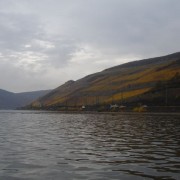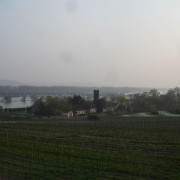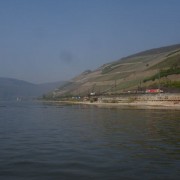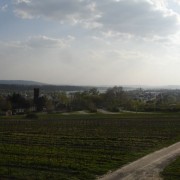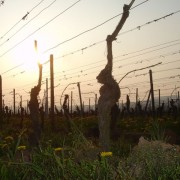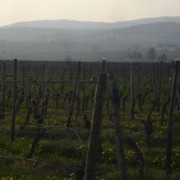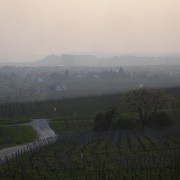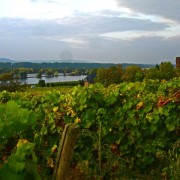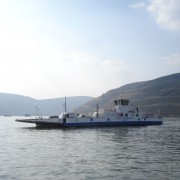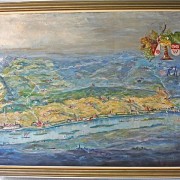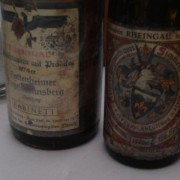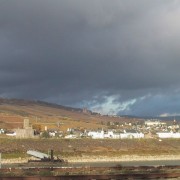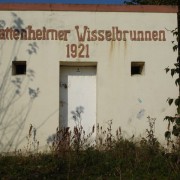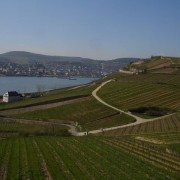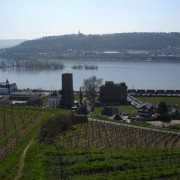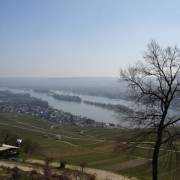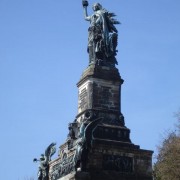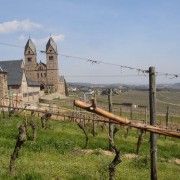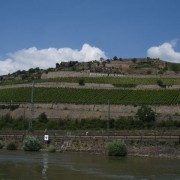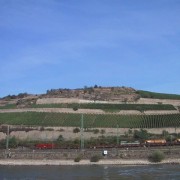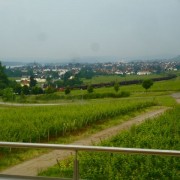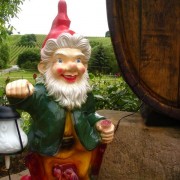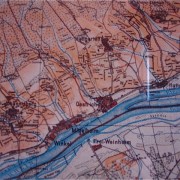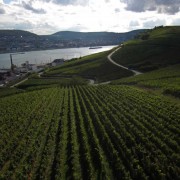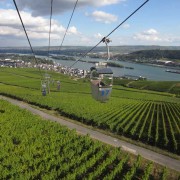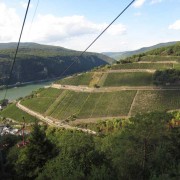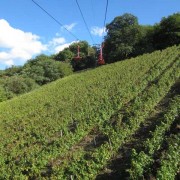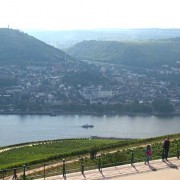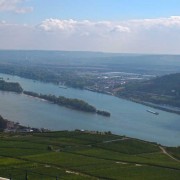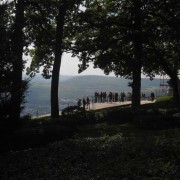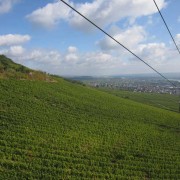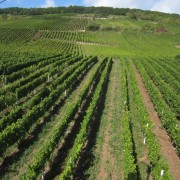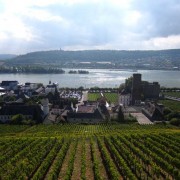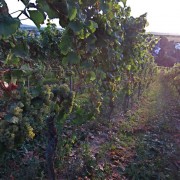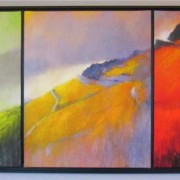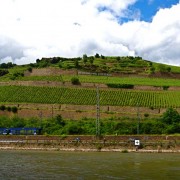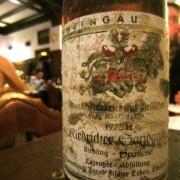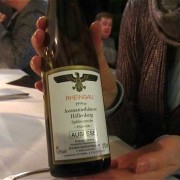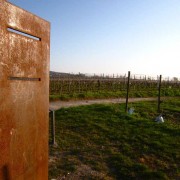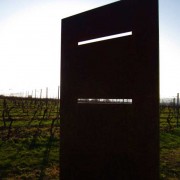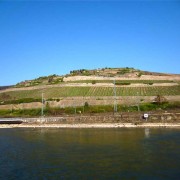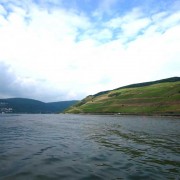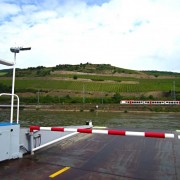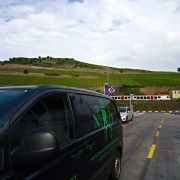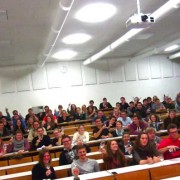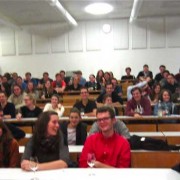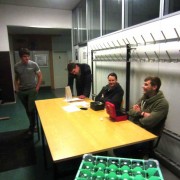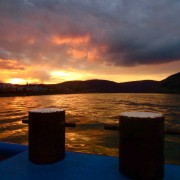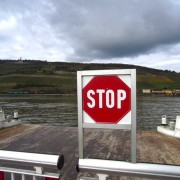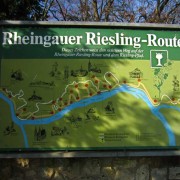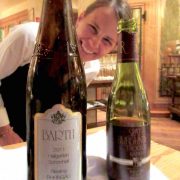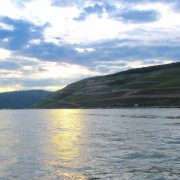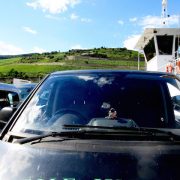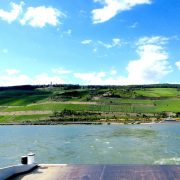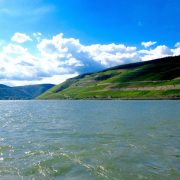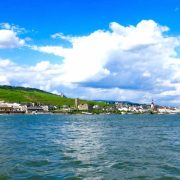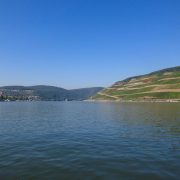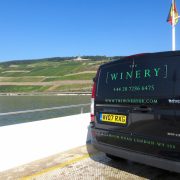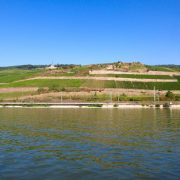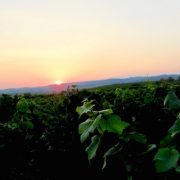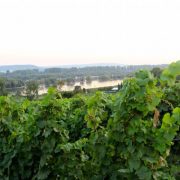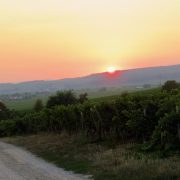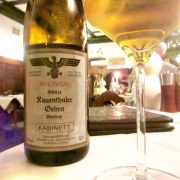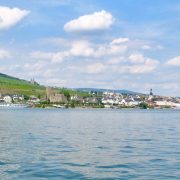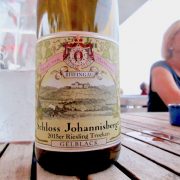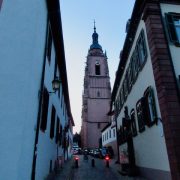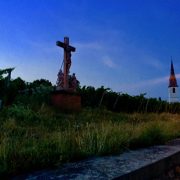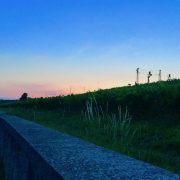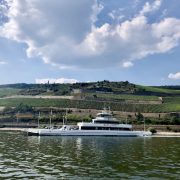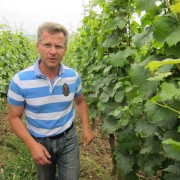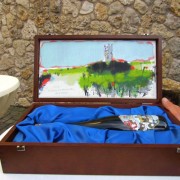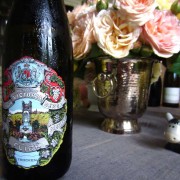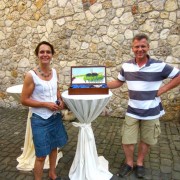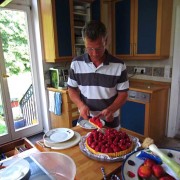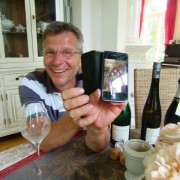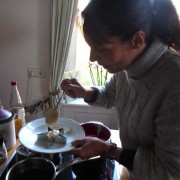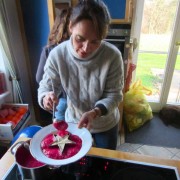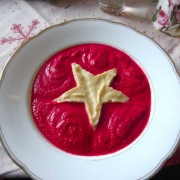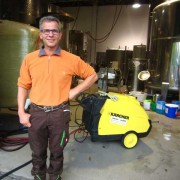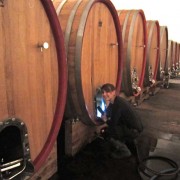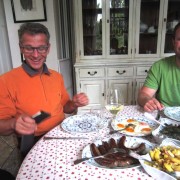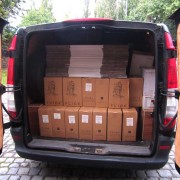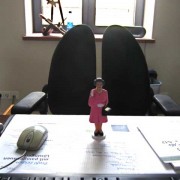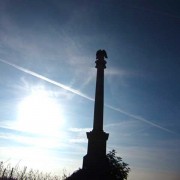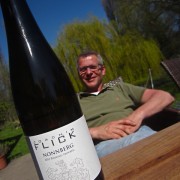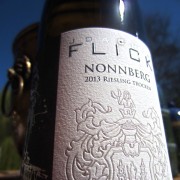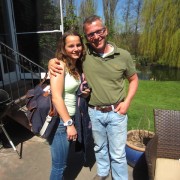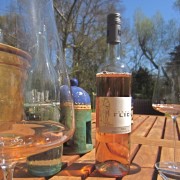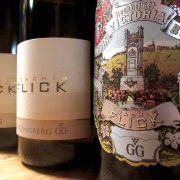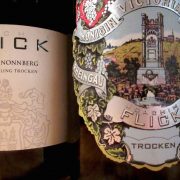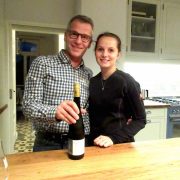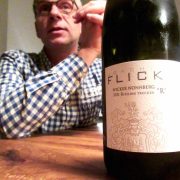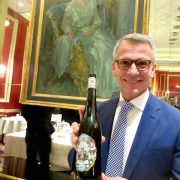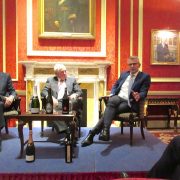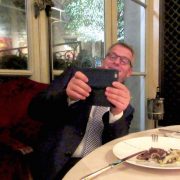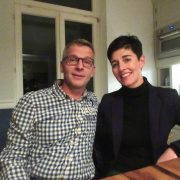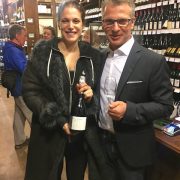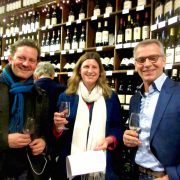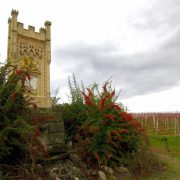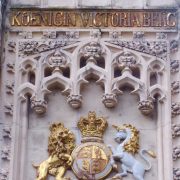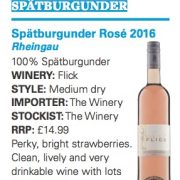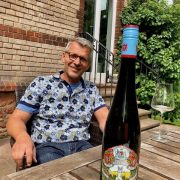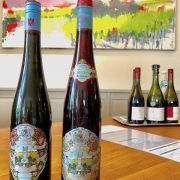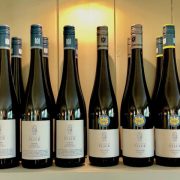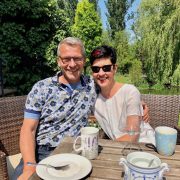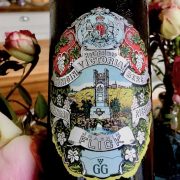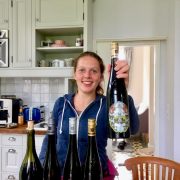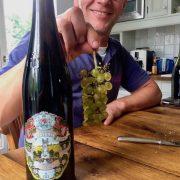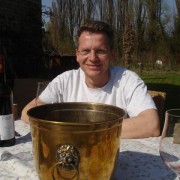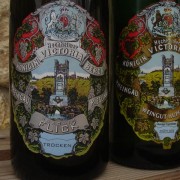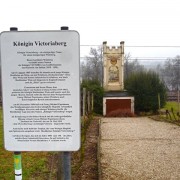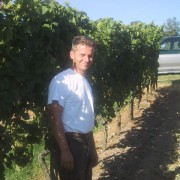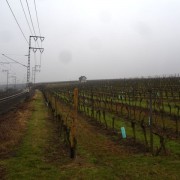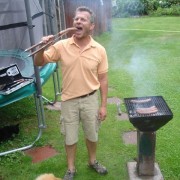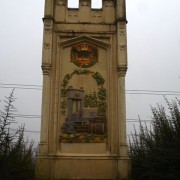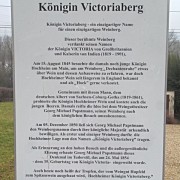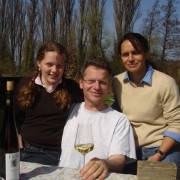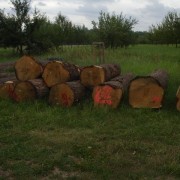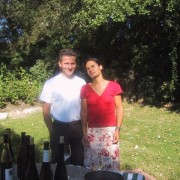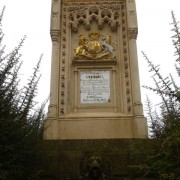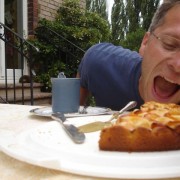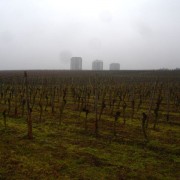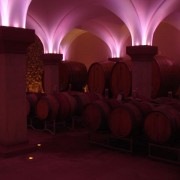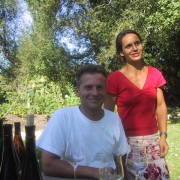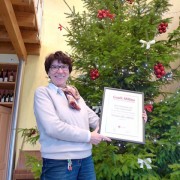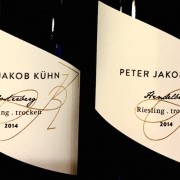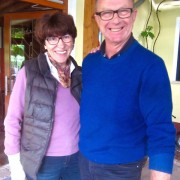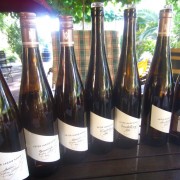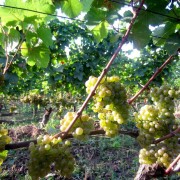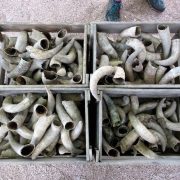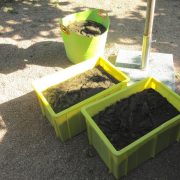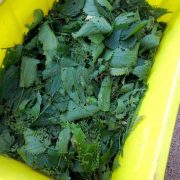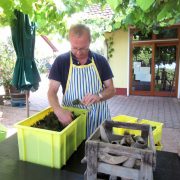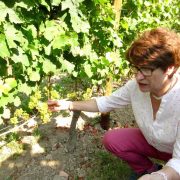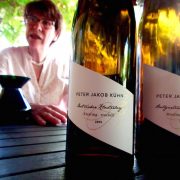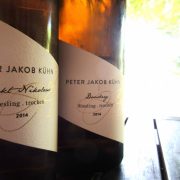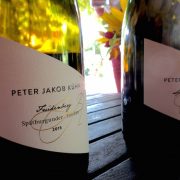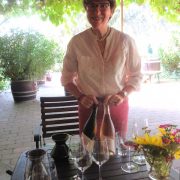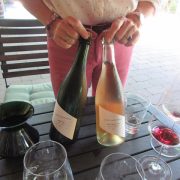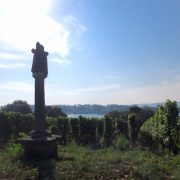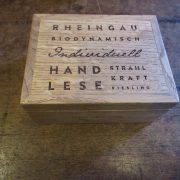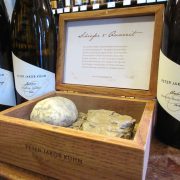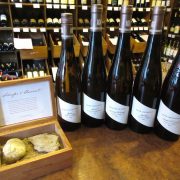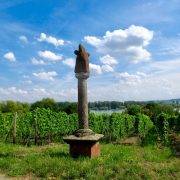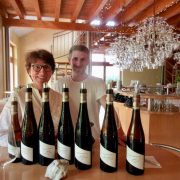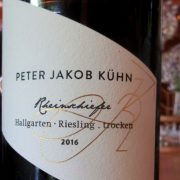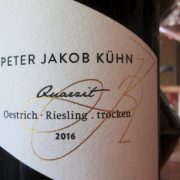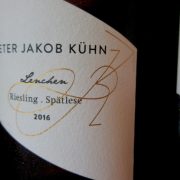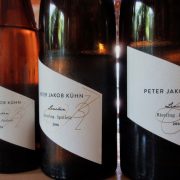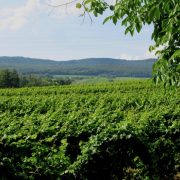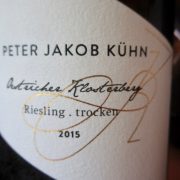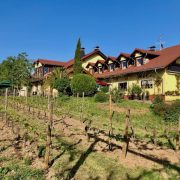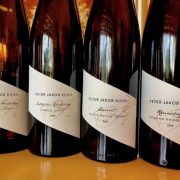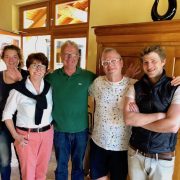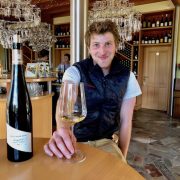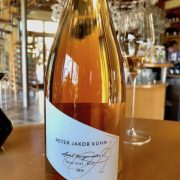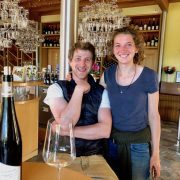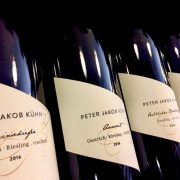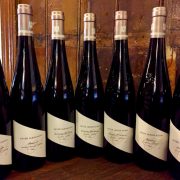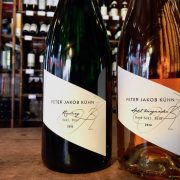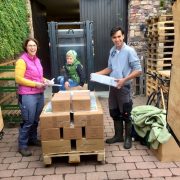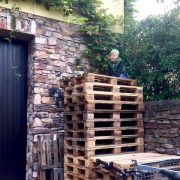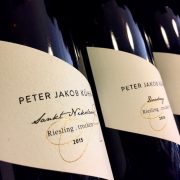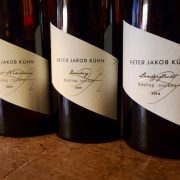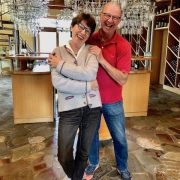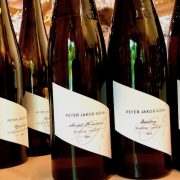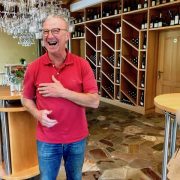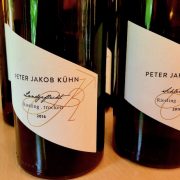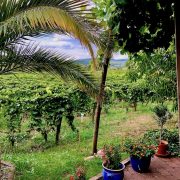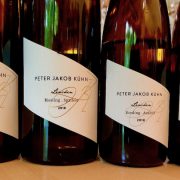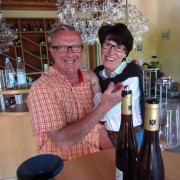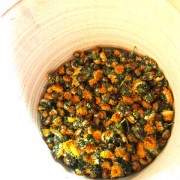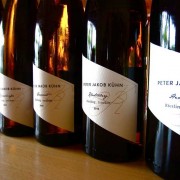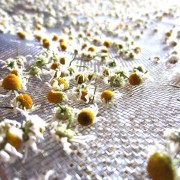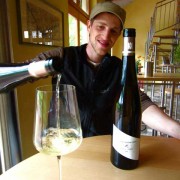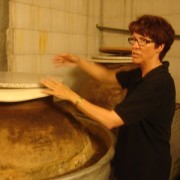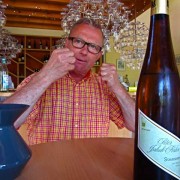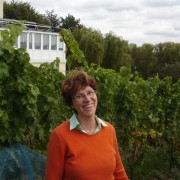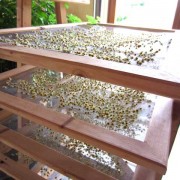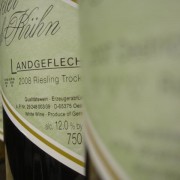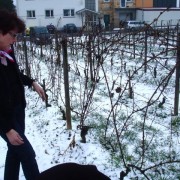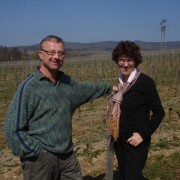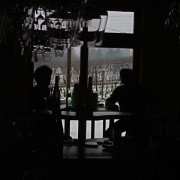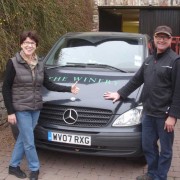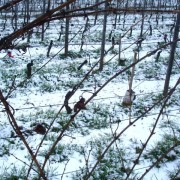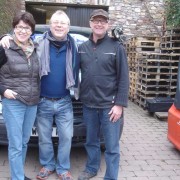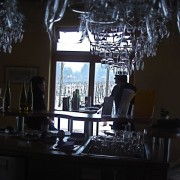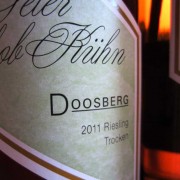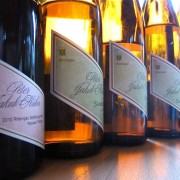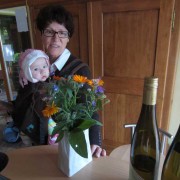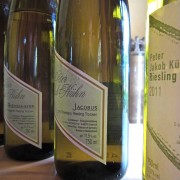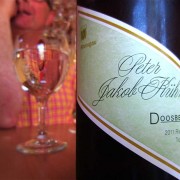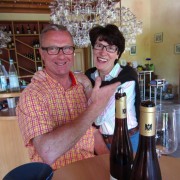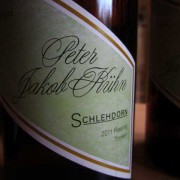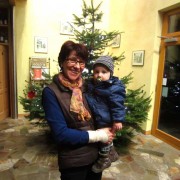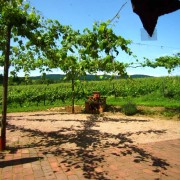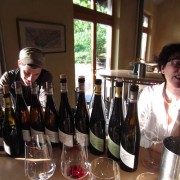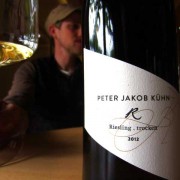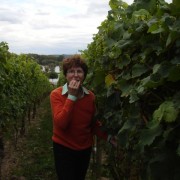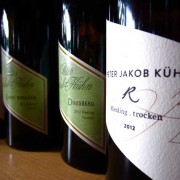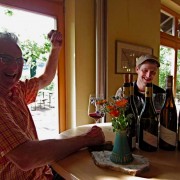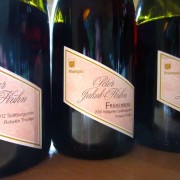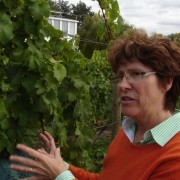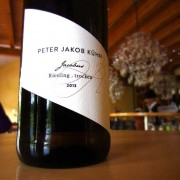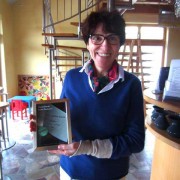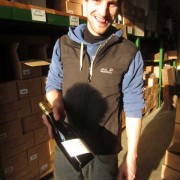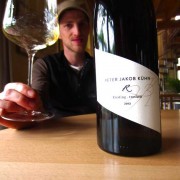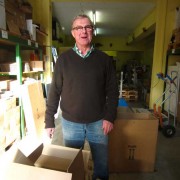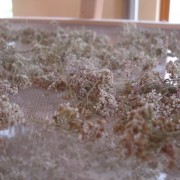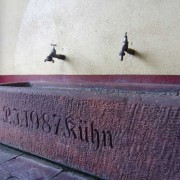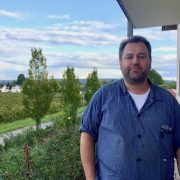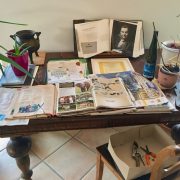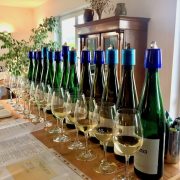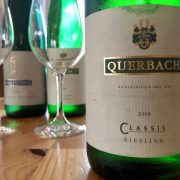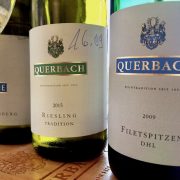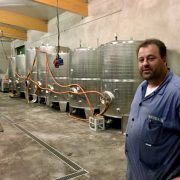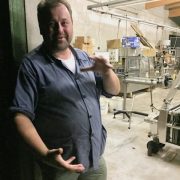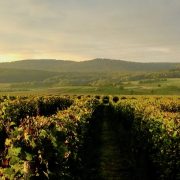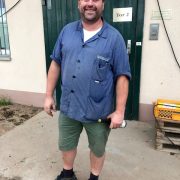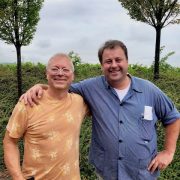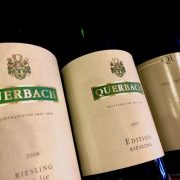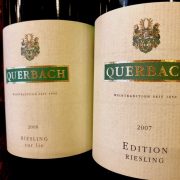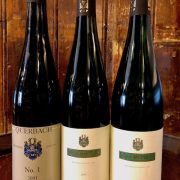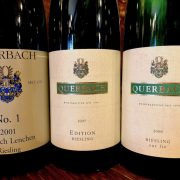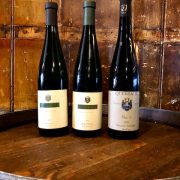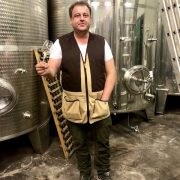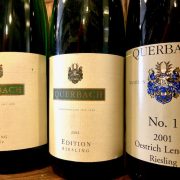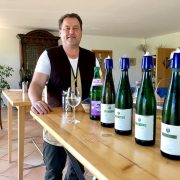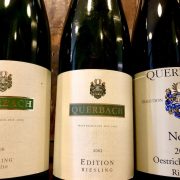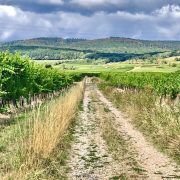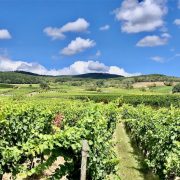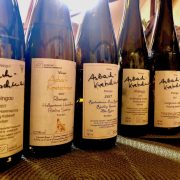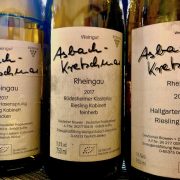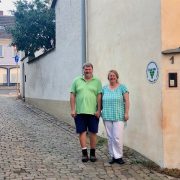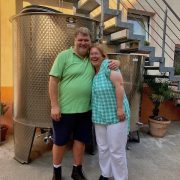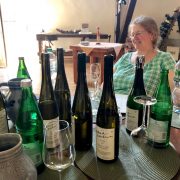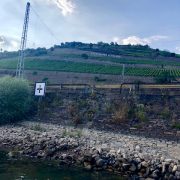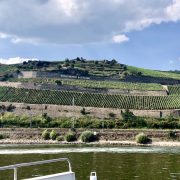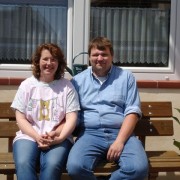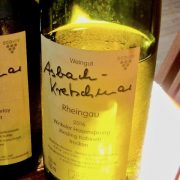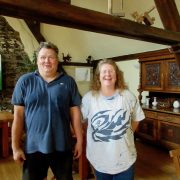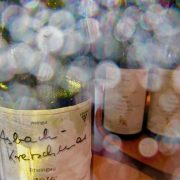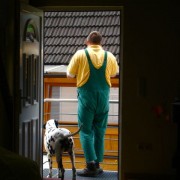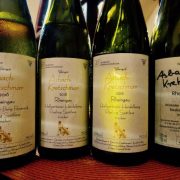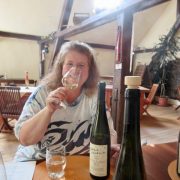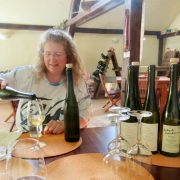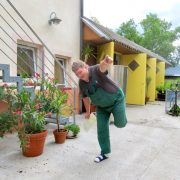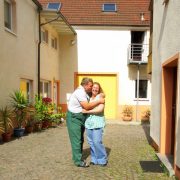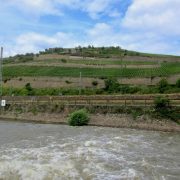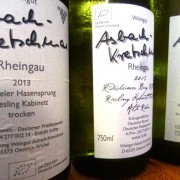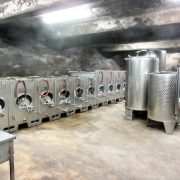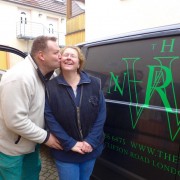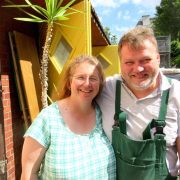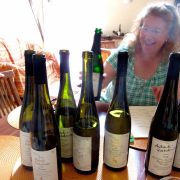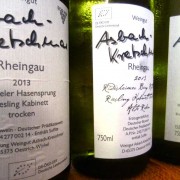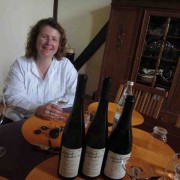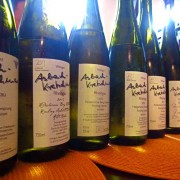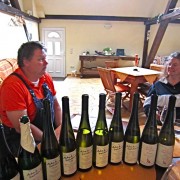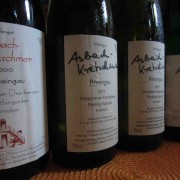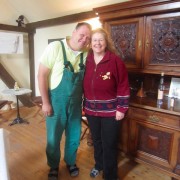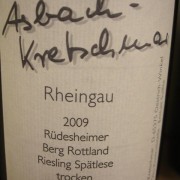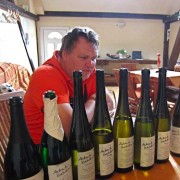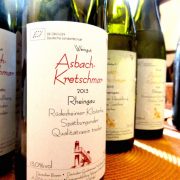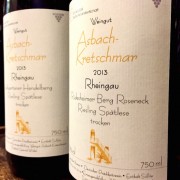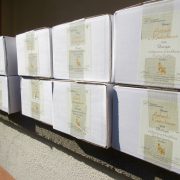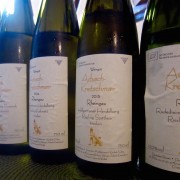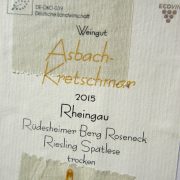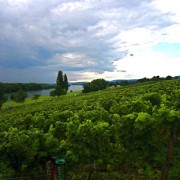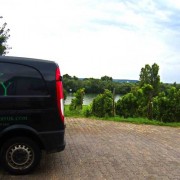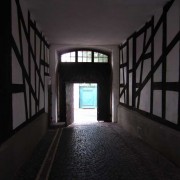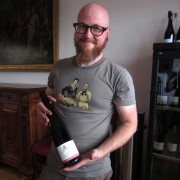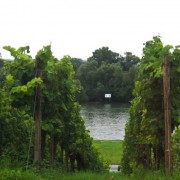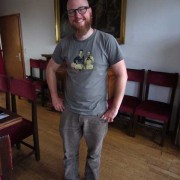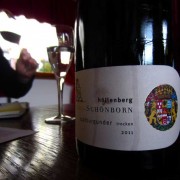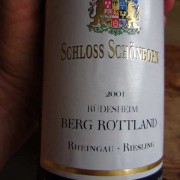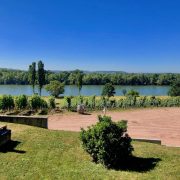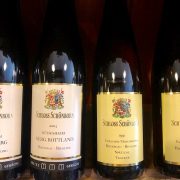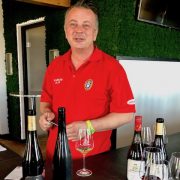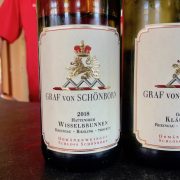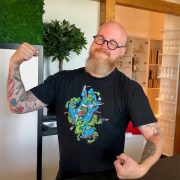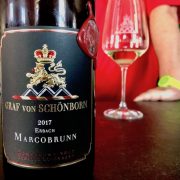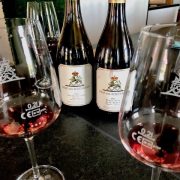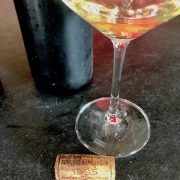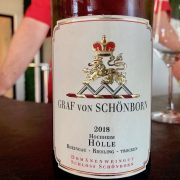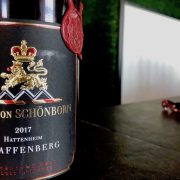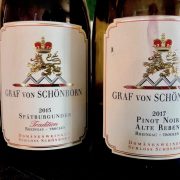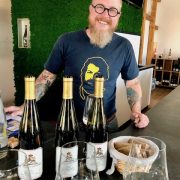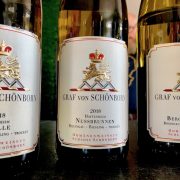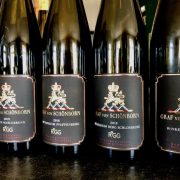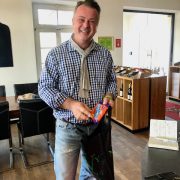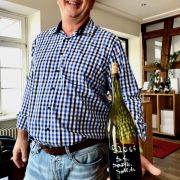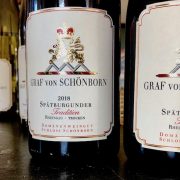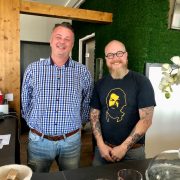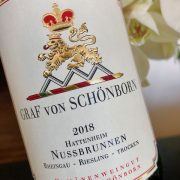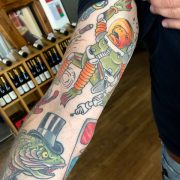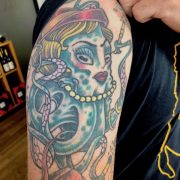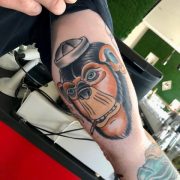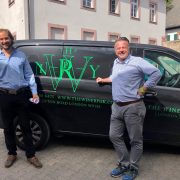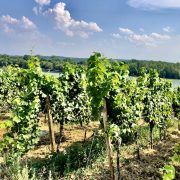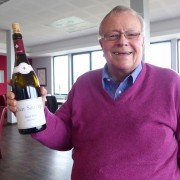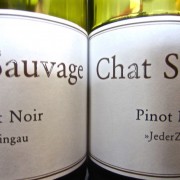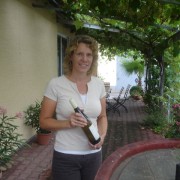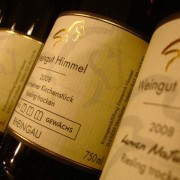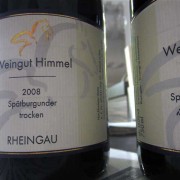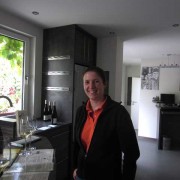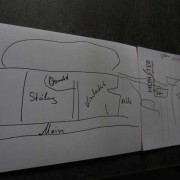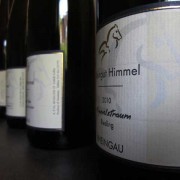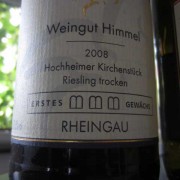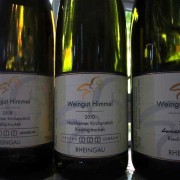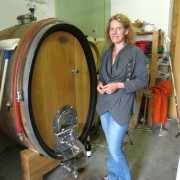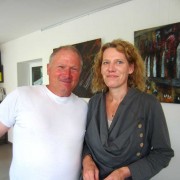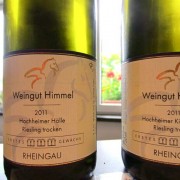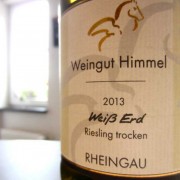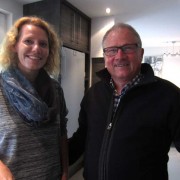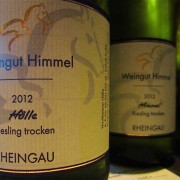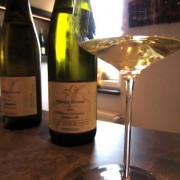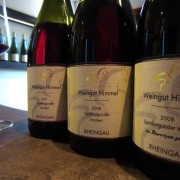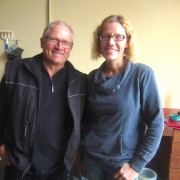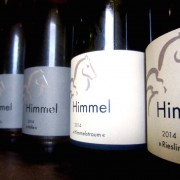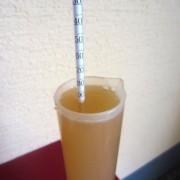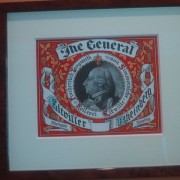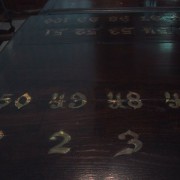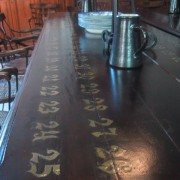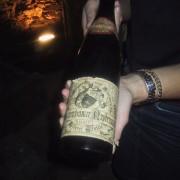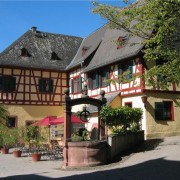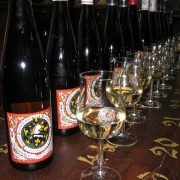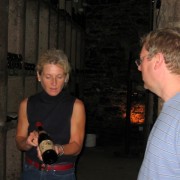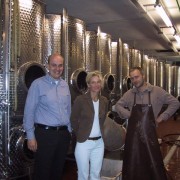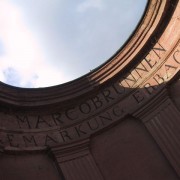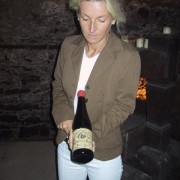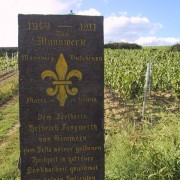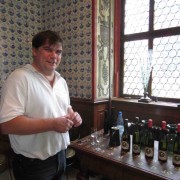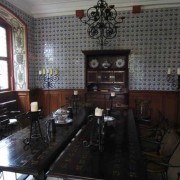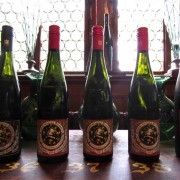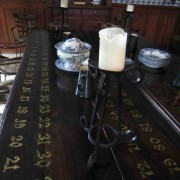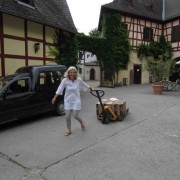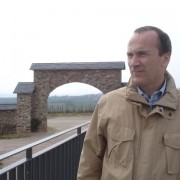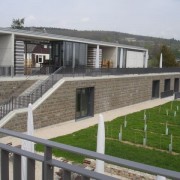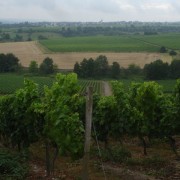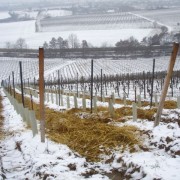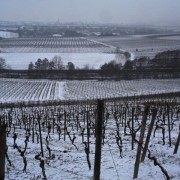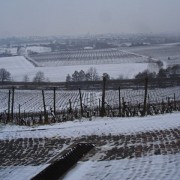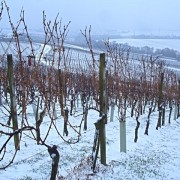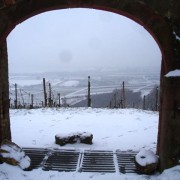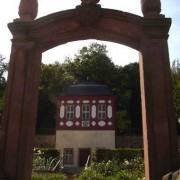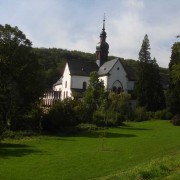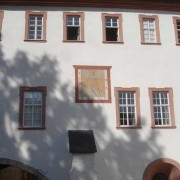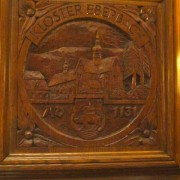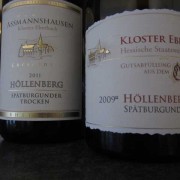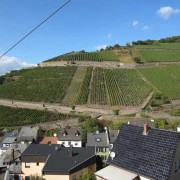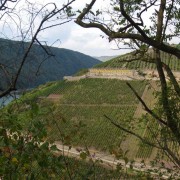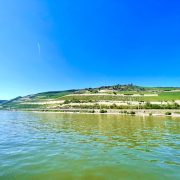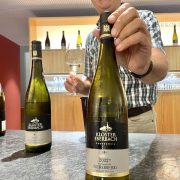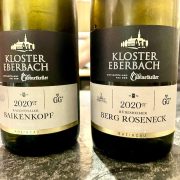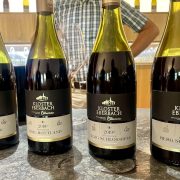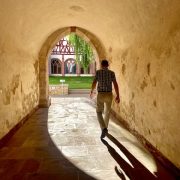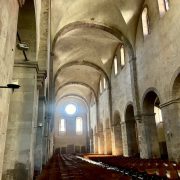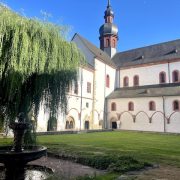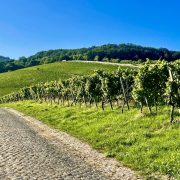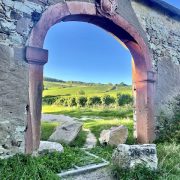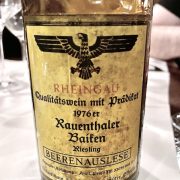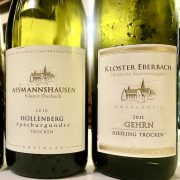Classical, long-lived Riesling from the south-facing slopes centred between Rudesheim and Wiesbaden. Perfumed and floral on the nose, with wonderful precision in the mouth.
JB Becker (Walluf) ORGANIC
Like something out of Laurel and Hardy, Maria Becker sloshed some Riesling out of the window anointing a surprised postman – and so the crazy world of the Beckers continued to unfold around us. They are one of the best double-acts we have encountered in Germany, complete with an excitable dog and the moustachioed brother Hans-Josef, the winemaker who looks suspiciously like a circus ringmaster, who has a spring in his step following his recent marriage to Eva Engel, a woman 30 years his junior.
Brother and sister team, Hans-Josef and Maria Becker, have made distinctive Riesling for decades in their maze-like buildings and cellar by the Rhine at Walluf. Although they were the first in the world to use the cutting-edge glass closure, their wines are made in the traditional way; “the way our Grandfather made wine”, with a long, slow fermentation in huge, old wooden barrels called Fuders. The style is utterly traditional and utterly distinctive, untouched by fashion. Maria often turns up beautifully mature bottles from the darkest recesses of their dark, damp cellar for us; dry Rieslings from 1989, 1997, 2001 and 2004, mature fruity Spatlese from 1990 and the 1976 that we drank over a decade ago with enormous enjoyment at Zum Krug and that brought us knocking at their door.
Flick (Wicker) ORGANIC/VEGAN
Hardly anyone has heard of the village of Wicker. It is part of the other bit of the Rheingau next to Hochheim where the River Main meets the Rhine and from whose slopes you can watch the planes on final approach to Frankfurt airport. Although wine has been in the Flick family since 1775, it is only now, through Reiner’s rising fortune, that Wicker is being put on the map. The family live in a renovated 13th century mill and outhouses, and work their 14ha of vines – scattered across 102 separate parcels in two villages. Jewels in their crown are the Wickerer Monchsgewann and Nonnberg (a monopole), Hochheimer Holle and, more recently, Victoriaberg, where Reiner spends much of his time working with the soil, trying to bring it alive. The wines have blasted their way onto the German wine scene over the past half decade. We found modern but stately wines here – sometimes with savoury herbal notes, such as thyme or lavender. Supercharged Rheingau, classical lines but definitely supercharged.
Reiner has unfathomable energy; running his winery, making wine, running events in their venue down the road, barbecuing for 300 guests, hunting in the forests near Frankfurt, making wild boar sausages, experimenting with new grape varieties (Cabernet Blanc?!), making barrels from wood felled from his own land, building a new cellar with a vaulted ceiling, putting in a light display to demonstrate the effect of different coloured light on the taste of wine…and so on.
Every time we visit, Reiner always has a new project. In 2010, we were almost as excited as Reiner that he managed to rent the vines in a small vineyard in Hochheim called Konigin Victoriaberg (Queen Victoria’s hill). This was Queen Victoria’s favourite wine and where the name Hock comes from (the British struggled to pronounce Hochheim so eventually referred to all Rhine wine as Hock). She was so taken with the wine that, on a visit to Germany in 1845, she asked to see it. She observed it from her carriage and, shortly after, the vineyard was named after her and a monument was built to commemorate the visit. It was great news that a grower of Reiner’s quality was now making wine from this legendary parcel.
Josef Laufer – Zum Krug (Hattenheim)
In the village of Hattenheim there is a wonderful hotel – Hotel Zum Krug – with a superb restaurant serving traditional German specialities for lunch and dinner, and a more ambitious Michelin-style menu available in the evenings.
Eccentric, bow-tied Josef Laufer is the owner. He is passionate about Rheingau wine and is an authority on the subject. His winelist is staggering : two inches thick with wines only from the region. He also has some vines of his own and makes delicious Sekt. German sparkling wine, although popular on the home market, can sometimes be a bracing, rather harsh experience, but not here. Beautifully made Brut and Extra Brut with bottle fermentation – dry, full of character with layers of flavour, and makes a wonderful change from Champagne.
Peter-Jakob Kuhn (Oestrich) BIODYNAMIC
Some of the most startling wines we have ever tasted come from Peter-Jakob Kuhn from Oestrich in the heart of the Rheingau – a magnificent south-facing slope overlooking the Rhine near Wiesbaden, west of Frankfurt. Peter-Jakob was certified organic in 2004 and then went the whole way to biodynamic, the extreme end of organic viticulture, where decisions are made according to the Lunar Calendar. Biodynamic viticulture is based on the teachings of Maria Thun, the gnarly 80-something guru in middle Germany, who in turn is a disciple of Rudolf Steiner, the Austrian philosopher who laid out his mission statement for an alternative agriculture in the 1920s. An increasing number of winemakers have switched to biodynamism. The whole family is involved and in-tune. His wife Angela, daughter Sandra and son Peter. It’s an impressive winery, totally committed and fearless. They have been experimenting with oak, ridiculously long lees contact (Schlehdorn) and have even made wine in two amphoras they bought in Spain. Watch out for the mad, haunting aromas of the wild yeasts. Exotic, oily, peppery, savoury – almost salty.
Fred Prinz (Hallgarten) BIODYNAMIC
Fred worked for many years at the large and well-known State Domain at Kloster Eberbach in Stadt Eltville. He started as Sales Director and then became responsible for the winemaking. He, his wife Sabine and their two children live in a second floor flat in the village of Hallgarten high up on the slopes above the Rhine. You only find evidence of what was his “hobby” in the garage below the flats. Here you will find a few tanks and pruning tools – a true garagiste! He and his wife built up their original 1.5ha of holdings in two vineyards around the village; Schonhell (generally used for the dry styles) and Jungfer (for the fruity, sweeter styles). The dry “Erstes Gewachs” (First Growth) comes from the Jungfer vineyard. Quality is high, yields are low, output tiny.
He green-harvests once or twice a year, stripping out 20-40% on each pass. In the cellar he allows the grapes to cold soak overnight before allowing them to ferment. This, Fred says, boosts the extraction and lowers the acidity. After fermentation he then leaves his wines for 4 months on the lees, adding more layers of complexity. The wines have a wonderful precision and focus – not overblown, just quietly persuasive.
Demand for his wine was so great that he gave up the day job to turn the hobby into a full time job. Uneconomic with just 1.5 hectares, he needed to find another hectare or two. Or three. He always keeps his ears open while he’s out working in the vines. Gossip and rumour are rife among the vines – who has been approached by who, who’s thinking of selling to who? Over the past five or six years he has managed to scoop up more parcels of old vines in his favourite locations, building his holdings to 7 hectares. Fred must be going through some kind of life change at the moment – he recently bought a Harley.
2013 is his first fully organic vintage.
Querbach (Oestrich-Winkel)
Peter Querbach (47) was a long-time member of the VDP (the Premier League of German growers). He eventually found the rules too restrictive and handed his membership back in 2014: a big step – like a chef handing back Michelin stars. So, the Rheingau Bad Boy is now free to do what he pleases. And what he pleases pleases us. Peter likes to age his Rieslings: it’s a joy to find wines going back twenty years and more. No problems with corks: he uses beer style crown cap closures.
He uses wild yeasts and almost all his Rieslings have between 8 and 12 grammes of residual sugar which means they hover around the strict threshold for trocken (dry). That said, the style is dry.
We were particularly taken with his Riesling Edition 2007 and the Riesling Classic 2008 – both are straw yellow, smooth, enveloping, mature.
We also loved his 2001 Oestrich Lenchen No. 1 (a wine we first tasted at Straub’s Schone Aussicht in Klingenberg, Franken). Deep yellow, full, mature, relaxed and thrilling.
Asbach-Kretschmar (Oestrich-Winkel) ORGANIC
Rudesheim is on the western edge of the south-facing Rheingau, where the Rhine then makes a sharp turn north. There’s a statue of Germania (not unlike Britannia) at the top of the hill, the car ferry from Bingen below. A cable car crosses the vines. We had long been searching for a great Rüdesheim Riesling and it was a BIO-vintner on another river, Rudi Trossen from the Mosel, who pointed us towards Peter and Tania Kreuzberger of Asbach-Kretschmar.
Peter and Tania met in Schloss Reinhartshausen in Erbach. Peter had recently finished his studies in Heilbronn and Tania was an intern. In 1992 Peter went to work at Asbach-Kretschmar, a small winery in Rudesheim owned by the Asbach family, who produce Germany’s best known Brandy, Asbach-Uralt.
In 1995 the Asbach family offered to sell the 4 hectares of vines and machinery to Peter and Tania. In 1999 they moved into their house and winery in a narrow cobble-stoned street in the village of Winkel – they were all set.
Peter and Tania apply such attention and loving care to their small parcels of vines: whenever we call they seem to be working in the vineyards. They have parcels in Hallgarten (Hendelberg), Winkel (Hasensprung – Hare’s Leap) and several scattered around Rudesheim, including Berg Roseneck.
Organic for over two decades: the previous owners started the conversion in 1992.
Peter and Tania’s Rieslings are benchmark Rheingau; opulent, oily, with an almost unctuous Baroque perfume emerging as the wine warms up.
Schloss Schonborn (Hattenheim)
Schloss Schonborn is one of the grand old estates of the Rheingau, tracing its vineyard ownership back to 1349. Today it is owned by the current Earl, Paul Graf von Schonborn, and managed with a light (yet thoroughly supportive) touch by his son, Alexander. He and his family have another wine estate, a castle and agricultural land in Franken (Graf von Schonborn Schloss Hallburg) – check out the classic Bocksbeutel bottles on our shelves.
They own top-notch vineyards at either end of the Rheingau (Rudesheim and Hochheim) and in the middle (in Geisenheim, Oestrich, Winkel, Hattenheim and Erbach). We have been visiting with increasing frequency to plunder their deep cellar of mature vintages with the help of their winery manager, Marcel von den Benken. Recent vintages, made by fully-tattooed winemaker Florian Franke, are also fabulous – from classic Rheingau dry Estate Riesling, through the Erste Lage bottlings (1er Cru), and sensational GGs (Grand Crus).
They also make some no-nonsense Spatburgunder – mainly Oestricher Doosberg with a splash of Hochheimer Reichestal. It’s a charming, light-coloured Pinot with hints of autumn leaves and bracken in the nose, salty minerals in the mouth.
Schloss Vaux (Stadt Eltville)
It was Claudia von der Papen, one of our talented interns from Geisenheim who brought us our first bottle of Schloss Vaux. We were very impressed. It turns out that Schloss Vaux is one of the top sparkling wine producers in Germany. Schloss Vaux originally started in Berlin in 1868 and in the 1880s had the opportunity to buy a winery in Metz, which became Chateau Vaux. Fifty years later it was time to move from Metz to Eltville where they focused on making sekt from top Rheingau sites. From the beginning it was based on the French Champagne House model. Although they own no vines, they have longstanding grape contracts with top growers such as Kloster Eberbach and Langwerth von Simmern and then make startling sparkling versions of the legendary Steinberg and Erbacher Marcobrunn Rieslings and the sparkling red Assmannshauser Hollenberg from Spatburgunder. Steinberg with bubbles? Hoillenberg with bubbles? Crazy. And yet…delicious. Cuvee Vaux, their calling card, is a blend of Pinot Blanc and Pinot Noir, with a splash of Riesling.
Chairman of the Board is a real Graf (Count), Nikolaus Graf von Plettenberg.
Chat Sauvage (Johannisberg)
We were having dinner at Zum Krug in Hattenheim in the Rheingau one Wednesday evening, when Josef Laufer Junior (Zum Krug’s excellent chef) flashed a bottle in front of us that looked suspiciously like Burgundy. “You really have to try this!” he said. Try it we did and next day we were rattling the gates of Chat Sauvage in Johannisberg. Gunter Schulz is from Hamburg, made his fortune in the construction trade and developed a bit of a Burgundy habit. An expensive DRC type habit (Domaine de la Romanee Conti, the most sought-after Burgundy there is). Given that DRC isn’t for sale and given that he didn’t want to leave Germany, he set up 27 year-old winemaker Michel Stadter with some excellent old vines and a brief for uncompromising quality. Unfiltered and unfined, we were startled by the style and polish of these Pinots from a region overwhelmingly known for its Riesling.
Himmel (Hochheim) ORGANIC under conversion
It was a tip from Angela Kuhn that brought us to the door of heaven in Hochheim. Himmel is German for heaven, and yes, we think Annette and Emmerich Himmel’s dry Rieslings are heavenly. Hochheim Riesling was Queen Victoria’s favourite wine – and where the word “Hock” comes from, back when German wines were the most expensive in the world. As you’d expect from the Rheingau, their Rieslings are a geological extravaganza in your mouth. Perfumed, blackcurrant leaf, petrol, peach and spice, surging with racy freshness. Daughter Katrin is now working in the winery alongside finishing her studies at nearby Geisenheim, the top wine university in Germany. Their 2011s are electric.
Langwerth von Simmern (Stadt Eltville)
Crazy label, crazy wine! Well, crazily fabulous anyway. The high-class von Simmerns may have been going since 1464 but their wines are bang up to date with their oily, almost unctuous Baroque perfume and limey, minerally dry finish; just the way we like it.
Eva Fricke (Kiedrich)
Our eccentric, Berlin-based, journalist mate Stuart Pigott has often tipped us on hot new growers. “Stuart here. I must tell you about something really special. Eva Fricke. She’s the winemaker at Leitz and has been doing her own thing on the side. I told her she should charge double what everyone else is charging. ” Thanks, Stuart. Very helpful! Roll forward a few weeks and we’re back in Germany having dinner with Erni Loosen. Yes. La-di-dah. He asks who we’re seeing and I mention Eva Fricke. “Oh, I know Eva.” What I’d neglected to say was that we hadn’t actually made the call yet. Next day we get a call from Eva, who is in London showing Leitz wines. “Eva here. I’m sorry I didn’t realise we had a meeting” (well we didn’t, yet) “I just wanted to make sure I would be there to meet you.” The jungle wire works again. Fantastic. You only have to think it and say it out loud, even if it’s not actually to the right person, and lo-and-behold it happens! If only that was always the case. So the following evening, the striking, blue-eyed woman from Bremen shows up at Zum Krug for dinner with her two bottles. “I have a half hectare across two red slate terraces at Lorch. I was looking for a special soil. I was looking for slate, which is hard to find on the Rheingau.” And the wine is delicious. Intense, but not showy.
Wind forward three years and Eva has finally given up her 24/7 job at Leitz to concentrate on her own wines.
Kloster Eberbach (Eltville-Eberbach)
The State of Hessen’s Domain, formerly a cloister until Napoleon booted the nuns out and ‘gifted’ it to the nation. We had long been obsessed with one of their most prestigious walled vineyards, a monopole (they own it solely) called Steinberg (stone hill). With major holdings in Erbacher Marcobrunn, Rauenthaler Baiken, Rudesheimer Berg Schlossberg, Hochheimer Domdechaney, Wiesbadener Neroberg, the wonderful red wine slopes at Assmannshauser Hollenberg and not forgetting some vines in the Hessische Bergstrasse – this is a serious, historic estate. Dieter Greiner, who arrived in 2010, and his team made enormous strides, building a bold, modern cellar below the Steinberg vineyard and an impressive visitor centre at the Kloster Eberbach. This legendary estate was once again producing thrilling wines to match its reputation from a century ago.
Dieter Greiner bumped into us again at Zum Krug in early summer 2023. One thing led to another: Pranav and David M visited, tasted and ordered enthusiastically. The relationship has been officially rekindled after a decade-long break and our van returned with some of their marvellous dry Rieslings and Spatburgunders. We’ll be showing the Erste Lage (1er Cru) Gehrn dry Riesling. Before agonising too much, it is pronounced Gear-n (Gear as in Top Gear, with an ‘n’ on the end). Easy, right? Now let’s try to pronounce Assmanshauser Hollenberg Spatburgunder Grosses Gewachs. Just joking.
